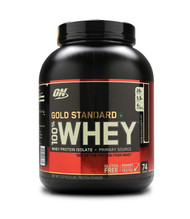Whey Protein Isolate And Muscle Building
Posted by Adam Arrowsmith on 10th May 2019
Whey Protein Increases Protein Synthesis
(Almost) Everything You Need to Know About Building Muscle with Whey Protein
There may not be a muscle building supplement as unanimously beloved as whey protein.
Scientists, nutritionists, amateur and professional athletes and bodybuilders alike all love and appreciate everything that whey protein brings to the table, and all of them agree that if you’re going to use just ONE supplement to build muscle faster you’ll want to make sure that it is whey protein.
You don’t get this kind of unanimous consensus with any other product on the market today.
Whey protein is understood to have unparalleled abilities to flood your body with the fundamental building blocks of muscle mass, helping you to get leaner, stronger, and to build more muscle mass faster than you ever would have been able to before.
Let’s dive a little bit deeper into everything you need to know about building muscle quickly with the help of this protein supplement!
What exactly is whey protein?
Whey protein is a mixture of a number of different proteins that are all isolated from the liquid part of milk that is separated from fat during the cheese process – the curds and whey that Little Miss Moffat was snacking on while she sat on her tuffet.
Cow’s milk contains two major protein sources – casein which makes up 80% of the proteins you’ll find in milk and whey that accounts for the other 20%. The whey protein is found in the watery portion of dairy milk, and when cheese is being produced these proteins are separated and used to be tossed as a byproduct.
Today, however, this watery substance filled with protein and goes through a number of different production processes that inevitably result in whey protein powder, powders that can find themselves added to protein shakes, meal replacement shakes, protein bars, or good old-fashioned protein powder.
The importance of whey protein and BCAA supplements when building muscle
Even someone that has only just barely begun to start lifting weights understands that muscles are little more than protein fibers that have coalesced together, with proteins being one of the major building blocks of the human body and as fundamental to life as oxygen and water.
Protein cells make our tendons, our organs, and our muscles but are also used throughout the body in our hormones, our neurotransmitter cells, and a variety of different enzymes, and a whole host of other fundamental molecules that make us who we are.
When proteins assemble together (working with other amino acids) they form up the core of our muscle, and by flooding your body with external sources of protein you supplement the protein that our body naturally produces – building muscle faster by fueling the natural protein synthesis process.
This is why whey protein is so important. Study after study shows that external sources of protein (like whey protein) provides more fuel for protein synthesis than our bodies could produce on their own – something that is further accelerated when you combine branched chain amino acids (BCAAs) to the equation.
Some of the amino acids we need for protein synthesis are naturally produced by the body’s cells on its own, but others need to be supplied by the fuel that we put into our bodies with every bite we take.
Studies like the one conducted by the Department of Cellular and Molecular Physiology at Pennsylvania State University College of Medicine show that for proper protein synthesis (the creation of new muscle and repair of the muscles we damage while training) there are nine different amino acids that the body needs for efficient operation – and whey protein is one of the best external sources for ALL of those amino acids on top of the extra protein it brings to the table.
We also know from research conducted by Dr. Jonathan Freeman that whey protein contains nitrogen, a key piece of the puzzle that helps to our natural nitrogen levels in favor of a positive nitrogen balance – helping the body to store more protein than it would have been able to otherwise, leading to increased protein synthesis.
Clinical trials like the one published with the National Institutes of Health also showed that whey protein helps to increase:
There are a variety of different whey protein types to pick and choose from, but the major three options are:
Whey protein isolate as 90% protein levels or higher, contains a lot less lactose and much less fat, but also lacks a lot of the other important nutrients found in concentrated whey protein that you need for skyrocketing overall protein synthesis.
Whey protein hydrolysate, sometimes referred to as hydrolyzed whey protein, is a type of this protein compound that has already been “predigested”. This increases its bioavailability but it also helps to trigger anywhere between a 28% and 43% spike in insulin levels compared to the other options.
At the end of the day, those looking to trigger the most amount of protein synthesis with the help of whey protein are going to want to lean towards the concentrated whey protein options. This offers a high level of protein but also includes the important BCAAs you need to trigger sky high levels of protein synthesis, and it also has a much better flavor which means you won’t have a hard time adding it to your daily diet.
References:
https://www.healthline.com/nutrition/whey-protein-...
https://www.ncbi.nlm.nih.gov/pubmed/18679613
https://www.ncbi.nlm.nih.gov/pubmed/16365087
https://www.ncbi.nlm.nih.gov/pubmed/808195
https://www.ncbi.nlm.nih.gov/pmc/articles/PMC61420...
